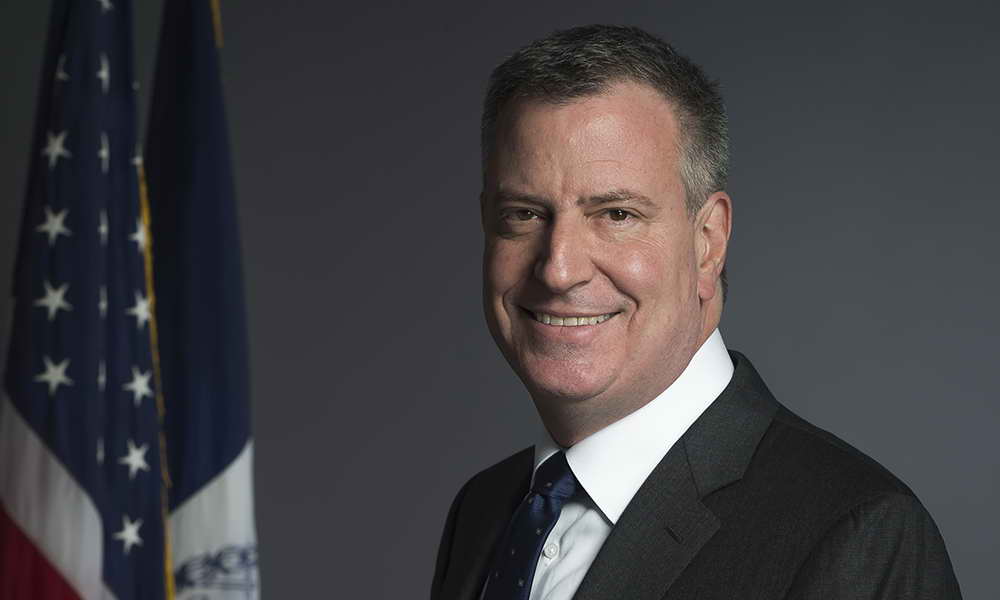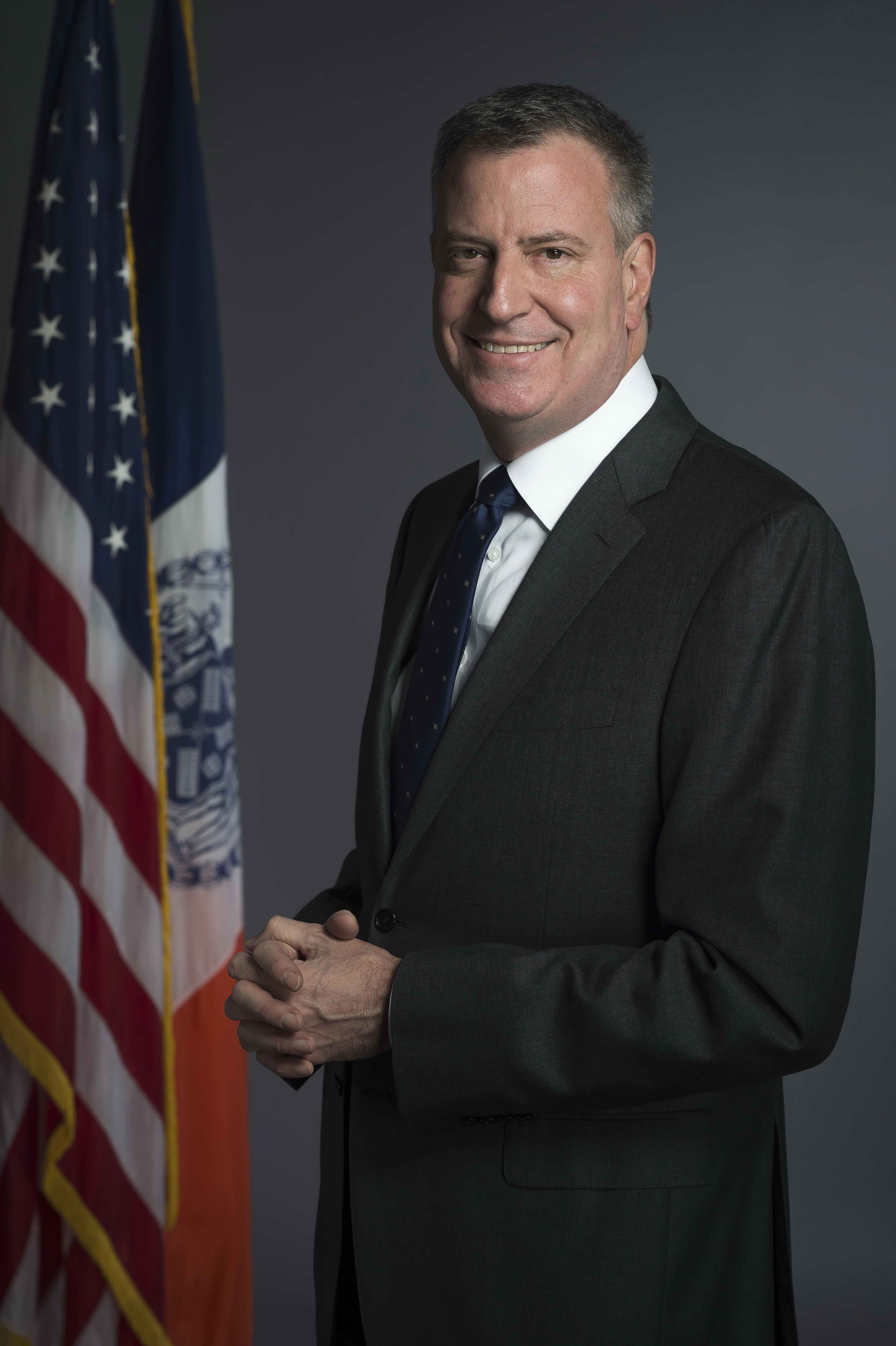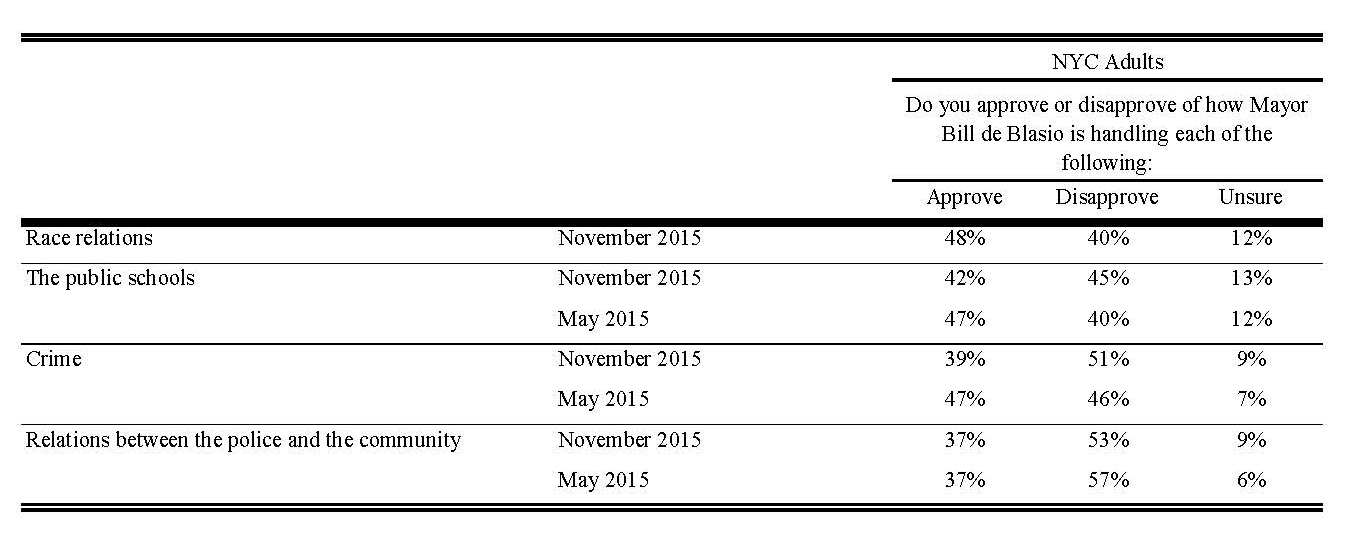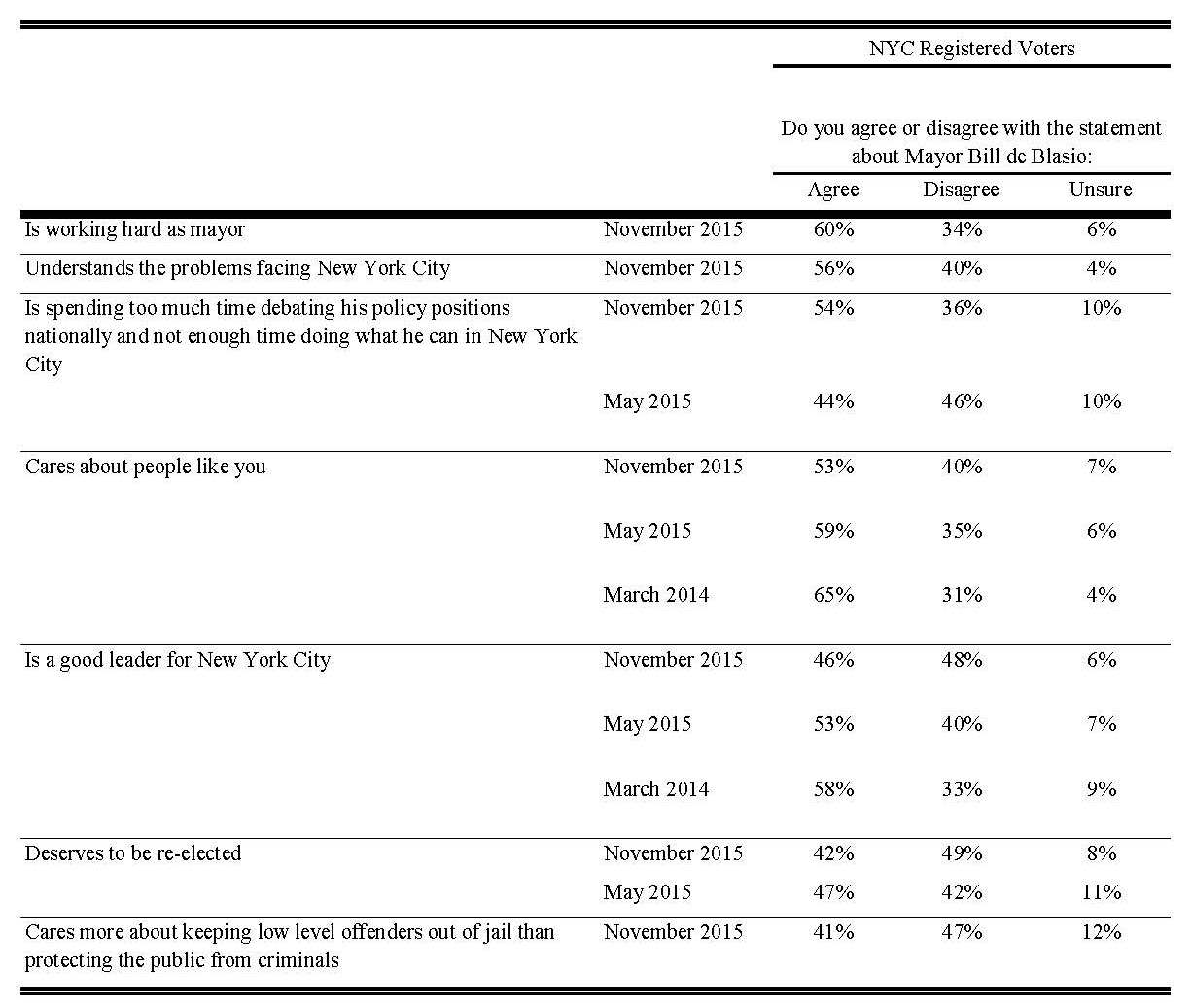November 3, 2015
11/3: Drop in de Blasio’s Approval Rating… Support among Base Erodes
Two years until New York City’s next mayoralty election, Mayor Bill de Blasio’s job approval rating has declined. To compound problems for de Blasio, support among his base has dropped, 9 points among African American voters and 12 points among Latino voters. Of note, the racial divide which has underscored views about, both, Mayor de Blasio and the city still exists, but that gap is less pronounced than in the past.
Mayor de Blasio’s approval rating among registered voters citywide stands at 38%, down from 44% in May. With the exception of Queens and Staten Island where de Blasio’s approval rating has inched up slightly, 33% to 37%, the mayor’s approval rating has fallen citywide. The most dramatic decline has occurred in Manhattan where 32% now rate de Blasio highly compared with 53% in the spring.
While de Blasio still scores higher among African American, 50%, and Latino voters, 37%, than white voters, 32%, Mayor de Blasio’s approval rating has fallen among both groups. Previously, the mayor received a 59% approval rating among African Americans and 49% among Latinos.
On the specifics of de Blasio’s job performance, the mayor has lost points on his handling of crime. Fewer than four in ten adults in the city, 39%, say they approve of his approach, and a majority, 51%, disapproves. In the previous Wall Street Journal/NBC 4 New York/Marist Poll, residents divided, 47% to 46%. On the issue of police and community relations, the mayor also receives low marks with 37% saying they approve of how he is handling the issue and 53% reporting they do not. Mayor de Blasio fares better on the issue of race relations where 48% of residents approve of the mayor’s approach. On education, residents divide with 42% reporting they approve of his handling and 45% saying they disapprove. New York City public school parents, 49%, are more likely to give Mayor de Blasio higher marks than residents, overall, on his handling of the schools.
Although his favorable score among registered voters has dipped from 59% to 52%, Mayor de Blasio remains well-liked. Of note, de Blasio’s positive score has declined 13 points among Latinos and 16 points among voters in Manhattan.
On the bright side for de Blasio, voters citywide think he is working hard as mayor, 60%, and believe he understands the problems facing the city, 56%. Despite a decline from 59% earlier this year, a majority of voters, 53%, still maintains the mayor cares about the average person, and a plurality, 47%, disagree that de Blasio cares more about keeping low-level offenders out of jail than protecting the public from crime.
However, the electorate divides, 46% agree to 48% who disagree, about whether or not de Blasio is a good leader for New York City. Previously, a majority, 53%, thought de Blasio was a strong leader for the five boroughs. Voters, 54%, also report de Blasio spends too much time debating his policies on the national stage and is not focusing enough attention on New York City. In the last poll, voters divided. 44% agreed he spent too much time on the national stage, and 46% disagreed. Overall, 37% of registered voters now think de Blasio is changing the city for the better, and 28%, up from 20%, believe he is changing it for the worse.
Fewer than four in ten voters, citywide, 38%, think the Big Apple is moving in the right direction. This is down from 45% in the spring and matches the lowest proportion of voters since January of 2011 to say New York City is on track. In addition, more residents, when compared with May, say the overall quality of life in New York City has gotten worse, 41%, since Mayor de Blasio became mayor, up from 33%.
What does this all mean for de Blasio? Nearly half of voters, 49%, say de Blasio does not deserve to be re-elected, and 42% think he does. This has flipped from the previous poll when a plurality of voters, 47%, reported the mayor deserved a second term, and 42% thought he did not.
Despite waning support for de Blasio, especially among his base, potential opponents are not well-known citywide and attract little support from Democrats. When matched against possible challengers for the 2017 Democratic primary, at present, Mayor de Blasio is the odds-on favorite. Even a slim majority of Latinos, among whom de Blasio has lost the most traction, supports him. Mayor de Blasio’s strength in a potential primary contest is significant with one exception. Bronx Borough President Ruben Diaz, Jr. edges de Blasio among Democratic voters in the Bronx.
POLL MUST BE SOURCED: Wall Street Journal/NBC 4 New York/Marist Poll
“Looking ahead to a re-election campaign, there is no single potential opponent on the horizon poised to defeat the mayor,” says Dr. Lee M. Miringoff, Director of The Marist College Institute for Public Opinion. “However, there is growing discontent among voters who have previously supported the mayor about the job he is doing.”
Poll points:
- 38% of registered voters citywide think de Blasio is doing either an excellent, 6%, or good, 32%, job in office. This is a 6 point drop in the mayor’s approval rating since May when he received 44%.
- While the proportion of white voters who approve of de Blasio’s job performance, 32%, is unchanged from the spring, fewer Latino voters and African American voters now give the mayor high marks. 37% of Latinos, down from 49%, and 50% of African Americans, down from 59%, approve of de Blasio’s job performance.
- By borough, the mayor has lost the most support in Manhattan. His approval rating in the borough is at 32%, down from 53%. In Brooklyn, 42% of voters, a drop from 49%, give the mayor good marks. 42% of those in the Bronx, a decline from 47%, approve of de Blasio’s job performance. Mayor de Blasio’s approval rating in Queens and Staten Island has increased slightly from 33% to 37%.
Mayor de Blasio on the Issues
Nearly half of residents, 48%, approve of how Mayor de Blasio is handling race relations in New York City. 40% disapprove. Half of the city’s white residents, 50%, are dissatisfied with the mayor’s job performance in this area in contrast to 60% of African Americans and 49% of Latinos who have a positive view.
Majorities of residents are unhappy with Mayor de Blasio’s handling of police and community relations, 53%, and crime, 51%. There is little change in perceptions of the mayor’s role when it comes to the police and city residents. However, earlier this year, residents divided about how the mayor approached the problem of crime in the city with 47% approving of his handling of the issue and 46% disapproving.
Mayor de Blasio has also lost support on how he is handling the city’s public schools. 42% currently approve, down from 47%. Still, nearly half of parents with a child in public school, 49%, approve of how he is tackling the issue.
Majority with Favorable View of de Blasio, but…
52% of voters, down from 59%, have a favorable view of de Blasio. 38% have an unfavorable one. Opinions of de Blasio among whites and African Americans are little changed. However, while more than six in ten Latino voters, 61%, have a positive impression of de Blasio, the proportion has declined from 74% in May.
Mayor de Blasio’s favorable rating has gone down citywide, except in Brooklyn. The most precipitous decline has occurred in Manhattan where 48% have a favorable opinion of the mayor, a 16 point change from 64% in the spring.
New York City voters attribute positive characteristics such as being a hard worker, understanding the problems facing the city, and caring about the average person to Mayor de Blasio. Additionally, they disagree that de Blasio emphasizes keeping low-level offenders out of jail at the expense of protecting citizens from crime.
However, there has been a decline in those who view the mayor as caring, as a good leader for New York City, and as a mayor who deserves to be re-elected. A majority now perceives de Blasio as spending too much time in the national spotlight.
When it comes to Mayor de Blasio’s overall impact on New York City, a plurality, 37%, says he is changing the Big Apple for the better, and 28% believe he is changing it for the worse. The proportion of those who believed the mayor was having a positive effect on the city in May was 40%. At that time only 20% thought he was making New York City worse.
Pessimism in New York City Grows
The proportion of New York City voters who think the city is moving in the right direction, 38%, is at its lowest since January 2011. Additionally, more than four in ten residents believe the overall quality of life in the Big Apple has gotten worse in the past year up from 33% last spring.
Poll points:
- 38% of voters, down from 45%, think the city is moving in the right direction, and a majority, 55%, says it is moving in the wrong one.
- Voters in Manhattan are the least optimistic. 31% of these voters report the city is moving in the right direction. This is a 19 point drop from 50% who had this view earlier this year.
- 41% of New York City residents think the overall quality of life in New York City has gotten worse in the last year, and 16% say it has gotten better. 19% believe it has stayed the same which is a bad thing, and 18% think it has remained the same which is a good thing. Three percent report the quality of life is about the same which is neither good nor bad.
- Whites, 51%, are more likely than African Americans, 37%, and Latinos, 39%, to think the quality of life in New York City has gotten worse.
- The proportion of whites who say the city’s quality of life has deteriorated has increased from 35%. And, there has been an 11 point increase in the proportion of African Americans and a 4% increase among Latinos who share this view.
- 42% of residents think the number of homeless, panhandlers, and mentally ill on the city’s streets have increased since de Blasio has become mayor. The same proportion, 42%, says the number has remained the same, and only 8% believe it has declined. Similar proportions of adults had these views in May.
- 60% of adults think the cleanliness of the subways has not changed since de Blasio became mayor. 15% say they are cleaner, and 15% report they are dirtier.
- Nearly six in ten residents, 59%, support the proposal to restrict costumed panhandlers in Times Square to designated areas. 32% oppose the plan.
Stop and Frisk Still Polarizing Issue
While 38% of residents want Mayor de Blasio to continue to reduce stop and frisk, 36% think the policy should revert to what it was during Mayor Michael Bloomberg’s administration. 16% think de Blasio should leave things the way they are now, and 10% are unsure.
About two-thirds of adults citywide have, at least, a fair amount of confidence in the New York City Police to keep them safe from violent crime.
Poll points:
- Nearly half of white residents, 49%, think stop and frisk should return to what it was during the Bloomberg years while 50% of African Americans and 42% of Latinos believe de Blasio should continue to reduce the policy. Still, 31% of Latinos and 24% of African Americans assert Bloomberg’s policy regarding stop and frisk should be reinstated.
- 66% of residents have either a great deal of confidence, 27%, or a fair amount of confidence, 39%, in the police to protect them from violent crime. This is up from 60% who had this view in the spring. 33% have either some confidence, 15%, or little confidence, 18%, in the NYPD to keep them safe.
- Whites, 82%, are more likely than African Americans, 59%, and Latinos, 50%, to have faith in the police to protect them. However, the proportion of African Americans with this view has increased from 49%. Latinos are little changed on this question.
- A majority of residents, 52%, supports drug treatment, not jail, for addicts who are repeat offenders and are convicted of a felony for drug dealing. 40% say these individuals should receive jail time.
De Blasio vs. Bloomberg
35% of city residents believe Mayor de Blasio is doing a worse job in office than former Mayor Bloomberg. One in four, 25%, says de Blasio is a better mayor than Bloomberg, and 35% believe there is little difference between the job performances of both mayors.
Poll points:
- A majority of whites, 56%, report de Blasio is a worse mayor than Bloomberg.
- Pluralities of African Americans, 45%, and Latinos, 40%, say de Blasio is doing about the same job as the former mayor in city hall.
Mayor de Blasio Bests Competition for 2017 Democratic Nomination
Mayor de Blasio currently does not face a formidable threat if he is challenged for his party’s nomination in 2017.
Poll points:
- If the 2017 Democratic primary for mayor were held today, de Blasio would receive 43% of the vote. New York City Comptroller Scott Stringer and Public Advocate Letitia James each receive 10%. Nine percent are for Bronx Borough President Ruben Diaz, Jr., 5% support Brooklyn Borough President Eric Adams, and 4% are behind U.S. Representative Hakeem Jeffries. 20% of New York City Democrats are undecided.
- Among Bronx Democrats, Diaz leads de Blasio, 34% to 29%.





